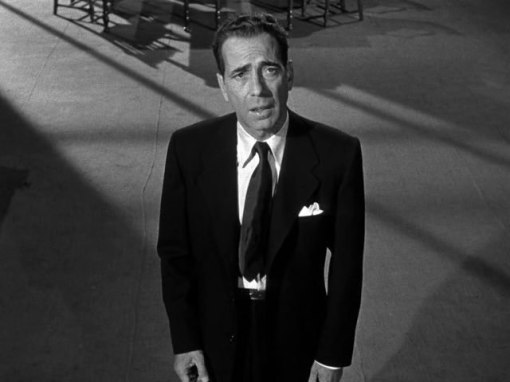Nicholas Ray’s interest in wayward youth tends to yield some of his best efforts, most notably Rebel Without a Cause and They Live By Night. This early effort, coming after They Live By Night, speaks to this interest and its central argument is an admirable one. Ray could be chastised for his bluntness, but the film’s discourse, the idea that the impoverished are unfairly criminalized is sort of stunning and remarkable, especially considering the era in which it is argued. I do not fault Ray for his bluntness, as I don’t think “subtle politics” is inherently smoother to digest, but this film ultimately pulls up short because it betrays the central argument. It ends up eating away at his own idea. He himself indulges into criminalizing poverty, but the fact that the film manages to illustrate this argument in an artful enough way (yes, parts are indeed hammy) means it is absolutely worthy of attention.
Nick Romano has a criminal past, which doesn’t make it difficult for the police to pin the murder of an officer on his hands.However, he swear he didn’t do it. He calls his lawyer, Andrew Morton, but he’s fed up with Romano constantly getting in trouble. Some silent stares from his social worker wife, Adele, convinces him to go to bat for Romano for one more time. The trial begins and Morton uses his opening statement to describe his relationship with Romano, how they met, and just what exactly the two went through in the past six years. The idea is that Nick Romano can’t be seen as innocent unless the proper context is established, because all signs already point to his guilt.
From a pure storytelling perspective, there is something I admire about how Ray structures his film. The opening hour is basically an extended flashback of Romano’s difficult adolescence as told by Morton to the jury. Then, the film immediately switches gears to a tense and sweaty court case. Traditionally, this could be viewed as sloppy filmmaking, but to me it shows Ray’s own youthfulness. It’s jarring, but the sloppiness is endearing to me. The film seems to work on its own level, one that is indeed forceful with social commentary, but at least doesn’t mask its discourse in a film that is typical and orthodox. On the contrary, Burnett Guffey’s cinematography is spectacular. The film frequently positions its subjects in the corner of the frame, almost as though they are spectators in a showing of the film itself, reinforcing the idea that crimes are not something performed in a blender. Instead, there are an influx of factors. It sounds like an attempt to dissolve responsibility, but he wants to re-center things on the individuals who are never criminals, but are deeply complicit in criminalizing certain groups.
I think what Ray is ultimately arguing here is not only insightful, but kind of ahead of his time. Morton’s closing remark is one of Bogart’s most dominant yet engaging moments as a performer. Many might see his argument as either far too eloquent or a boring tirade too simplistic in grouping his critique against “society.” Instead, there is something banal about saying society is the real criminal, but the film’s text extends its critique to something deeper. Perhaps, Bogart’s passionate final defense shows hints of an acknowledgement of hegemony, though that word obviously never reaches his lips. Ray using Bogart as a mouthpiece might seem like an error, one that wouldn’t be expected in a filmmaker that was championed by Manny Farber.
Ray’s biggest mistake is not being on the nose with his politics. Sure, it does bring the film to a halt at times but it doesn’t feel unnatural. Instead, Ray betrays his own politics. The film’s most crucial mistake comes twenty minutes in where we learn that the Romano family, reeling from the death of their patriarchal figure, has moved to the “worst neighborhood in town, arguably in the entire country” to quote Morton. The film wants to suggest that the poor are unfairly criminalized, but this very scene does the exact same thing. Instead, it seems to suggest that it is only interest in arguing the innocence of Nick Romano, not that of the other criminalized bodies entrenched in poverty. He’s just misunderstood and is unfairly thrown into a dog eat dog environment, but the rest of inhabitants are just pawns in reinforcing the discourse of an evil society. Of course, the film’s titular plea, to “knock on any door” suggests some sympathy for all, but Ray’s less pointed political moments reveal the holes in his argument. Later in the film, Kid Fingers, a well-known homeless man is mocked by Morton on the stand for the delight of the jury. Ray seems to forget his own point when its convenient in forming the idea of Romano’s innocence. He doesn’t apply this revolutionary thought to all of his subjects, instead reveling in the same unfair criminalization that he seems interested in rallying against.
Through all of this, I do find Ray’s idea to be one that is at best, admirable and worst, just woefully executed. This is an efficient film, with wonderful photography and a nice performance from Bogart but neither of those two elements are missing from his masterpiece two years later, In a Lonely Place. The unique quality here, the thing that would be the pull is Ray’s attempt at a socially-conscious film. Where he does succeed in some places, he ultimately winds up being something of a hypocrite. Sure, this doesn’t look particularly good with the film’s already forceful politics. The latter bothers me less, because I instead see it as eagerness on the part of a young filmmaker. Some of the film’s “flaws” in a sense are more beneficial (at least to me) than others, but I can’t forgive some of Ray’s more hypocritical moments.






Leave a comment